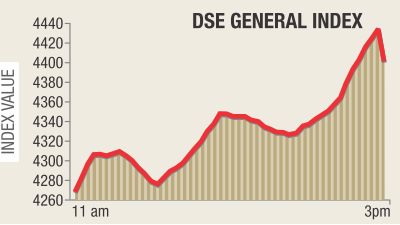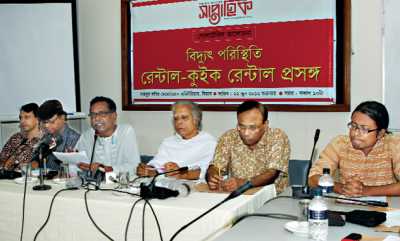Uncategorized
Stocks swing to the black in choppy trade
 Investors take to the streets to protest a huge fall in early trading on the Dhaka Stock Exchange in Motijheel in the capital yesterday. The benchmark index closed higher later in the day.
Investors take to the streets to protest a huge fall in early trading on the Dhaka Stock Exchange in Motijheel in the capital yesterday. The benchmark index closed higher later in the day.
Stocks bounced back yesterday, breaking a losing streak of seven days, on the back of a buying pressure from institutional investors.
DGEN, the main gauge of the Dhaka Stock Exchange, dropped around 150 points by midday, only to recover enough to pull the index back in the black by the close of the trading session.
The price-earnings ratio fell below 13 -- meaning it was a good time to buy -- which persuaded institutional investors to get in the act, market insiders said.
The DGEN eventually finished with 4,077 points, after gaining 88 points from the previous day.
IDLC, City Brokerage, ICB Securities, Salta Capital and NCCB Securities topped the list of net buy, their figures being Tk 8.75 crore, Tk 6.32 crore, Tk 4.12 crore, Tk 3.56 crore and Tk 1.84 crore respectively.
“Opportunist investors, who have reduced their portfolio exposure earlier and waited for favourable conditions, became active as prices looked rewarding for most of the investment grade stocks,” IDLC Investments Ltd said.
The merchant bank's Managing Director Md Moniruzzaman said an investment opportunity was created when the market fell below the 4,000-level, which, the investors grabbed with both hands.
Akter Hossain Sannamat, managing director and chief executive officer of Union Capital, said investors' low confidence led the market to fluctuate dramatically.
The market made a dramatic u-turn, thanks to the institutional investors, said Sannamat.
“They went on a buying spree as most of the good stocks became lucrative for long-term investments.”
He asked institutional investors to continue to be active in the market as it will enhance the confidence of small investors.
He also urged the government to take stockmarket-friendly actions to increase the flow of money.
Turnover, volume and trade were up by 8.81 percent, 12.51 percent and 18.31 percent respectively.
A total of 5.1 crore shares were traded, generating a turnover of Tk 201 crore.
On the DSE, 228 shares gained, 28 declined and 10 remained unchanged.
The Daily Star/Bangladesh/ 12th July 2012
Merchant banks, brokerage firms asked to compensate
The Securities and Exchange Commission (SEC) has asked all the merchant banks, brokerage
firms and other related institutions to give compensation to the small investors affected in the last year’s stock market debacle.
The commission ordered to Dhaka Stock Exchange, Chittagong Stock Exchange and Bangladesh Merchant Bank Association to submit implementation report on compensation package to the SEC by August, said a statement Tuesday. Some 209 brokerage firms under DSE, 79 under CSE and 28 merchant banks have been asked to take immediate steps regarding compensation.
Earlier, the commission approved a set of recommendations forwarded by the scheme committee assigned to implement the package.
As per the compensation package, the retailers who had investment of below Tk 10 lakh at the crash time will get a waiver of up to 50 per cent of the interest on margin loans.
The adversely affected investors will have the scope to pay the remaining interest payment through quarterly installments in three years.
The affected people are also entitled to a 20 per cent quota in all initial public offerings -- public and private -- to be from July, 2012 to June, 2014.
In April, the scheme committee, led by Md Fayekuzzaman, managing director of the Investment Corporation of Bangladesh (ICB), submitted its recommendations to the SEC for approval. The government in October last year announced a stimulus package for stock market investors to restore stability in the market.
As part of the package, the government formed a seven-member special scheme committee on November 27 to identify small investors who incurred losses, and the amount they lost.
The Daily Independent/Bangladesh/ 11th July 2012
Food import dips by half, govt saves $1b on bills
 A bumper output of rice has eased pressure on import.
A bumper output of rice has eased pressure on import.
Food grain imports have fallen by 56 percent in the current fiscal year, cutting the country's import bills by $1 billion, thanks to a rise in production of rice at home.
Rice and wheat imports slumped to 2.24 million tonnes between July and mid-June of the outgoing fiscal year, from 5.15 million tonnes in the July-June period a year ago, according to food ministry data.
During July to June 9 of the outgoing fiscal year, import payments for rice and wheat fell by $1.02 billion or 55 percent from $1.87 billion during the same period a year ago, according to Bangladesh Bank data.
The drastic fall in imports provides much relief to the policymakers at a time when export growth slows but the pressure on the balance of payments remains high due mainly to import of fuel to generate electricity through 'quick rental' power plants.
"The dip in food imports has helped curb a further depreciation of the taka," said economist Mahabub Hossain, attributing the reduced import to a rising rice output.
Rice yield rose by around 1 percent to 33.73 million tonnes in the current fiscal year from 33.54 million tonnes the previous year, enabling Bangladesh to become almost self-sufficient in its staple food, thanks to favourable weather, availability of fertiliser and its balanced use.
The reduced import of food grain has saved a good amount of subsidy, which the government can use in the power sector, said Hossain, who follows agriculture and rural economy.
"If the subsidy for food was needed, the government had to borrow more funds, which might make the economic situation of the country worse," said Hossain, also executive director of BRAC, a development organisation.
So, the condition of economy remains better because of the fall in food grain imports, he said.
He said import requirement for food for the next fiscal year would not be high unless there is any natural disaster.
Food and Disaster Management Minister Muhammad Abdur Razzaque said the government did not open fresh letter of credit (LCs) to import rice in the current fiscal year.
"We took delivery of rice against the contracts we signed the previous fiscal year," he said.
Razzaque said rice is in surplus now because of higher production in the past three harvests.
The government will review the overall production and stocks situation in November based on the production outlook of rain-fed aman rice, he said.
"We may need to export if we have surplus at that time," said Razzaque, explaining that export might be required to help prices of rice increase from the current low level to encourage farmers to stay with the cultivation of the crop.
A lack of space in public warehouses is another factor, said the minister, adding that import requirement for food grain would not be high the next fiscal year, beginning in July.
The government has cut its target for importing food grains by 15.4 percent to 1.1 million tonnes for the next fiscal year. Of the amount, wheat and rice import has been planned at 0.8 million tonnes and 0.3 million tonnes respectively, according to budget documents.
Till mid-June of the outgoing fiscal year, the government's imports fell by 52 percent to 1.01 million tonnes from 2.12 million tonnes the same period a year ago.
However, imports of wheat by the private sector may rise the next fiscal year, said Abul Bashar Chowdhury, chairman of BSM Group, a Chittagong-based commodity importer.
Including the government's planned wheat import, the total imports of the grain may rise to 2.3 million tonnes the next fiscal year from nearly 1.9 million in the outgoing year, said Chowdhury.
The Daily Star/Bangladesh/ 28th June 2012
Stocks rise as clouds clear over shareholding rule
 Stocks yesterday gained the highest gain in two months as investors went on a buying spree following a positive decision by the Securities and Exchange Commission.
Stocks yesterday gained the highest gain in two months as investors went on a buying spree following a positive decision by the Securities and Exchange Commission.
Sponsor and directors who failed to buy back the minimum 2 percent shares in their companies by May 21 will no longer be permitted to sit on the boards, the SEC said yesterday.
The decision sent the investors into heavy buying, with the benchmark general index DGEN surging by 134.05 points and finishing the day at 4,400 points.
“Investors injected capital into their respected stocks after hearing the positive decision from the SEC meeting,” said LankaBangla Securities in its daily market analysis.
Turnover stood at Tk 162 crore, after rising 13.6 percent from the previous day.
A total of 0.60 lakh trades were executed, with 3.69 crore shares and mutual fund units changing hands at the Dhaka bourse. All the sectors closed at green; non-bank financial institutions gained 4.14 percent, followed by power 3.35 percent and banks 2.94 percent.
Telecommunications and pharmaceuticals also rose, by 2.27 percent and 2.91 percent respectively.
Of the 268 issues that traded on the DSE, 253 advanced, nine declined and six remained unchanged.
Grameenphone, which went up by 2.2 percent, was the most traded stock of the day with 4.9 lakh shares worth Tk 10.10 crore changing hands.
Bangladesh Submarine Cable Company and Square Pharmaceuticals were the next most popular stocks.
GBB Power featured in the top ten gainers chart, having advanced by 10 percent.
Shyampur Suger Mills was the biggest loser of the day, slumping by 6 percent.
The Selective Categories Index, CSEX, the indicator of Chittagong Stock Exchange closed the day at 8432 points, after gaining 232 points.
The Daily Star/Bangladesh/ 27th June 2012
Rental power benefits vested groups
 Prof Dr Anu Muhammad speaks at a roundtable in Dhaka Friday.
Prof Dr Anu Muhammad speaks at a roundtable in Dhaka Friday.
The government is continuing power generation through rental power plants to help maximise profits of a section of people, despite having its huge negative consequence, speakers said yesterday.
Instead of running the quick rentals, the government could generate 1,600 megawatt more power through renovating the run-down power stations in last three years, they told a roundtable.
Weekly magazine ‘Shaptahik’ organised the roundtable in Dhaka, attended by civil society members and energy experts.
The speakers also suggested that the government should prioritise gas-based and state-owned power plants for low-cost power generation. A nexus of bureaucrats, professionals and politicians is cashing in from the acute power crisis and creating money through rental powers.
They pointed out that supplying gas to private stations, depriving the low-cost state ones, is a part of that blueprint.
“The retention of power crisis along with continuing rental powers is a clear indication of making country’s utility sectors profit-making ventures for the private sector,” Prof Dr Anu Muhammad, who teaches Economics at Jahangirnagar University, said.
“The repeated power rate hikes and setting Tk 13 to Tk 19 per unit price for uninterrupted power are parts of the roadmap of that conspiracy,” he continued.
He said price hike has not been done for improving the power situation, but to compensate the mistakes of the government in the sector and benefit a handful of opportunists.
Dr MM Akash, professor of Economics at Dhaka University, said the government initially went for the emergency solution to offset huge power crisis it inherited from the previous government.
“But, actually it was a wrong decision and created a hotchpotch in the whole economy,” said Akash.
Dr Anu Muhammad said the government could easily make 2,400MW of power only spending Tk 12-15 billion by improving the efficiency of the existing plants. On the contrary, it spent nearly Tk 320 billion to generate 900MW from rental or quick rental powers, he said.
The government is cutting subsidies being prescribed by the International Monetary Fund; but not the causes behind the subsidies. He said subsidies are given to ensure health, education, and small entrepreneurship for common people. But now these are going to give business to a vested quarter.
He said IMF uses its loans as an instrument to create a platform for private sector or multinational companies.
Taking part at the discussion, Syed Abul Moksud said people are now becoming intolerant about the power crisis, which has been made artificially.
He called for forming a highly-powered citizen committee to investigate irregularities taking place in the rental powers.
The Daily Sun/Bangladesh/ 23th June 2012



